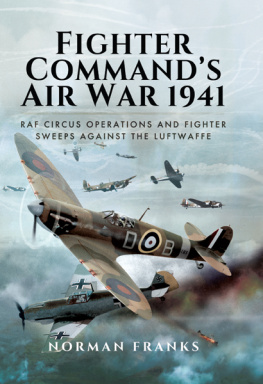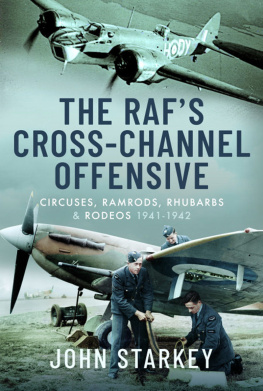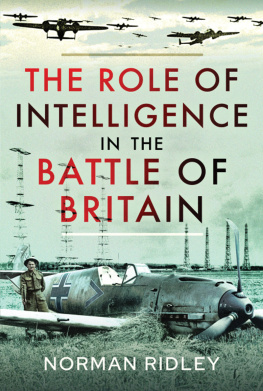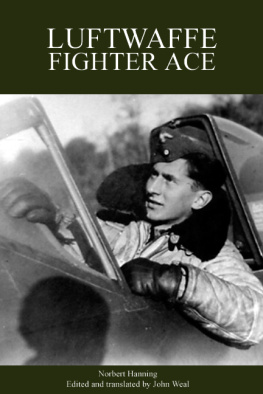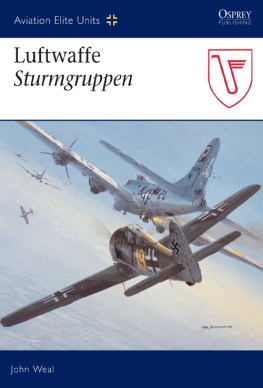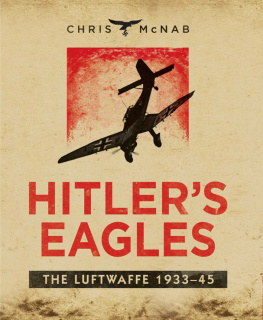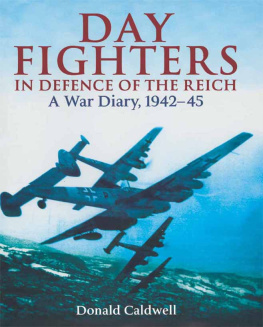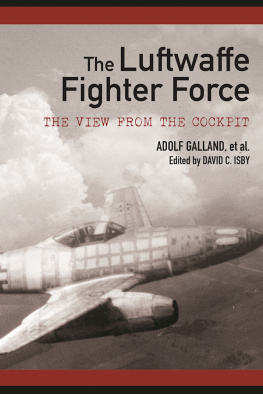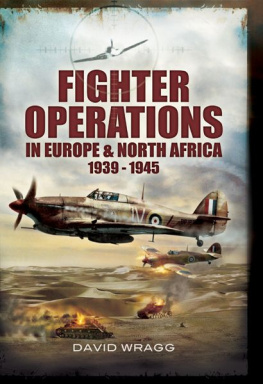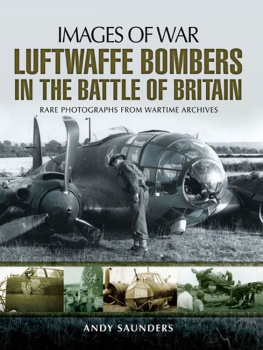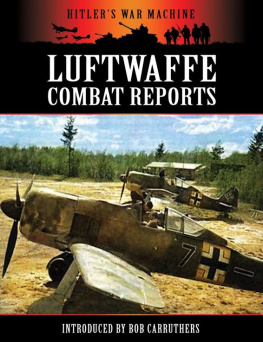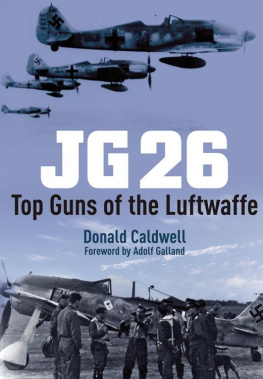
First published in Great Britain in 2016 by
Pen & Sword Aviation
an imprint of
Pen & Sword Books Ltd
47 Church Street
Barnsley
South Yorkshire
S70 2AS
Copyright Norman Franks 2016
ISBN: 978 1 47384 722 4
PDF ISBN: 978 1 47384 725 5
EPUB ISBN: 978 1 47384 723 1
PRC ISBN: 978 1 47384 724 8
The right of Norman Franks to be identified as the Author of this Work has been asserted by him in accordance with the Copyright, Designs and Patents Act 1988.
A CIP catalogue record for this book is available from the British Library
All rights reserved. No part of this book may be reproduced or transmitted in any form or by any means, electronic or mechanical including photocopying, recording or by any information storage and retrieval system, without permission from the Publisher in writing.
Typeset in Ehrhardt by
Mac Style Ltd, Bridlington, East Yorkshire
Printed and bound in the UK by CPI Group (UK) Ltd,
Croydon, CRO 4YY
Pen & Sword Books Ltd incorporates the imprints of Pen & Sword Archaeology, Atlas, Aviation, Battleground, Discovery, Family History, History, Maritime, Military, Naval, Politics, Railways, Select, Transport, True Crime, and Fiction, Frontline Books, Leo Cooper, Praetorian Press, Seaforth Publishing and Wharncliffe.
For a complete list of Pen & Sword titles please contact
PEN & SWORD BOOKS LIMITED
47 Church Street, Barnsley, South Yorkshire, S70 2AS, England
E-mail:
Website: www.pen-and-sword.co.uk
Contents
Acknowledgements
I give sincere thanks to a number of people who have helped or advised me in the writing of this book. Many of them were men who saw action in 1941, most of whom have now left us. Fellow historians Andy Saunders, Chris Goss and Chris Shores have my respect and thanks.
This book should be read in conjunction with John Foremans book RAF Fighter Command Victory Claims of WW2 (Part Two), Red Kite, 2005, and my own RAF Fighter Command Losses of WW2, Vol 1 (revised) 193941, Ian Allan, 2008.
Prologue
R egular conferences were held at Northolt to discuss our various problems; the AOC presided and, amongst others, the leaders of the fighter wings and the bomber leaders attended. On one such occasion I raised the question of just what our purpose was in carrying out these operations. If it was to destroy the industrial potential of the various targets and so reduce the contribution of industry by the Occupied Countries to Germanys war effort I maintained that it would require a far, far greater bomber force than we had so far escorted.
If, I continued, the bombers were merely there as bait to bring up the fighters so that they could be destroyed then we should restrict our radius of activity to that which would permit us to fight without the nagging fear of running out of fuel. The mental obstacle seriously interfered with a pilots fighting spirit and it was my opinion that we had already lost far too many first class men because these factors were not receiving sufficient consideration.
Air Vice-Marshal Leigh-Mallory looked rather taken aback at this and he turned to his Group Captain Operations, Victor Beamish, who was a very experienced and successful fighter pilot, and asked him what he thought. Victor said that he agreed with me so the AOC turned to another of his staff officers and asked his opinion. My answer to Kent is weve done it! he replied.
Although this officer had a very fine record in the First World War he had not operated in the second conflict. I was furious and was quite rude in the remarks I flung back, but it was no good: the AOC preferred the second opinion and we continued to go to Lille and lose good men, all to little purpose.
Wing Commander J. A. Kent DSO DFC, leader of the Northolt Fighter Wing in 1941.
Chapter 1
What will the New Year Bring?
T he winter weather at the end of the momentous year of 1940 curtailed air operations over Britain, and particularly southern Britain. The main achievement as far as Winston Churchill and his Government were concerned was that German forces seemingly poised across the Channel to invade this island had, at least for the time being, been prevented from doing so. The Royal Air Force had successfully denied the Germans the necessary air superiority over southern England, which was a prerequisite for any air or seaborne assault to take place. Those who gave themselves the luxury of believing that the Battle of Britain had been won, had no way of knowing that better weather in early 1941 would not herald a continuation of this Battle, and that an invasion might yet develop and take place.
History now records that no such attempt would be made even though the German Luftwaffe had every reason to assume their attacks against southern England and other parts in the north, would continue once spring began and they had recouped the serious losses incurred during the previous summer and autumn. Indeed, with the night bombing of British towns and factories now in full swing, why would their airmen think that they would not soon again be pitting themselves against the RAFs fighter pilots in order to have another try to wrest air superiority from them and dominate the skies for a sufficiently long period to allow an assault by troops, both from the air and from the sea, while bomber crews did their level best to prevent Britains Royal Navy from spoiling the party? There was adequate evidence that the German High Command had intentions of using the massed invasion ships and barges that crammed captured French ports along the Channel coast. Hitler may have deluded himself that Britain might well surrender, or at least try to negotiate some sort of peace settlement in the circumstances, but that never happened nor was it even seriously contemplated.
Adolf Galland, a successful German fighter pilot and Kommodore of a Geschwader of fighter aircraft, who would in not so far a time, head the Luftwaffes fighter arm, was clear in his post-war memoirs, that what was called the Battle of Britain lasted into 1941. In the early weeks of the New Year, German fighter aircraft were frequently flying Frei Jagd sorties over southern England, and particularly across Kent and Sussex. While these free hunts were exciting for the Luftwaffe pilots and kept the local RAF fighter squadrons occupied, these incursions were no more than nuisance raids, and nothing to compare with the vast formations of bombers and fighters of August and September 1940.
Meantime, although there was still the threat of a continuation of the summers battles, Churchill and his war council felt cheered that they had appeared to have won an important round in the war, and while blooded, were far from bowed. In the best traditions of war strategy, talk was now of the best form of defence being offence.
RAF fighter pilots had been taking it for months, not only over Britain, but earlier, during the campaign in France, which led to that country falling under the control of Germany, and the British army and her air force being kicked back across the Channel. Was there now a chance of hitting back, and dishing some out instead?
Viscount Trenchard, a man who had led the British air forces during the First World War, and now thought of as being the Father of the RAF, was still a man in high position and to whom many listened. Made Marshal of the RAF in 1927 at the age of 54, he was now, in 1941, aged 68, but his influence still held sway.
Trenchard had been Chief of the Air Staff in the early 1920s so he knew virtually everyone of note in the Service and although long officially retired, he was always welcomed when he turned up to give his advice and help council many of the new age of commanders who had all known him throughout their rising careers. In this way of his he had talked to Air Chief Marshal Sir Charles Portal KCB DSO MC, who had become Chief of the Air Staff in October 1940.
Next page
